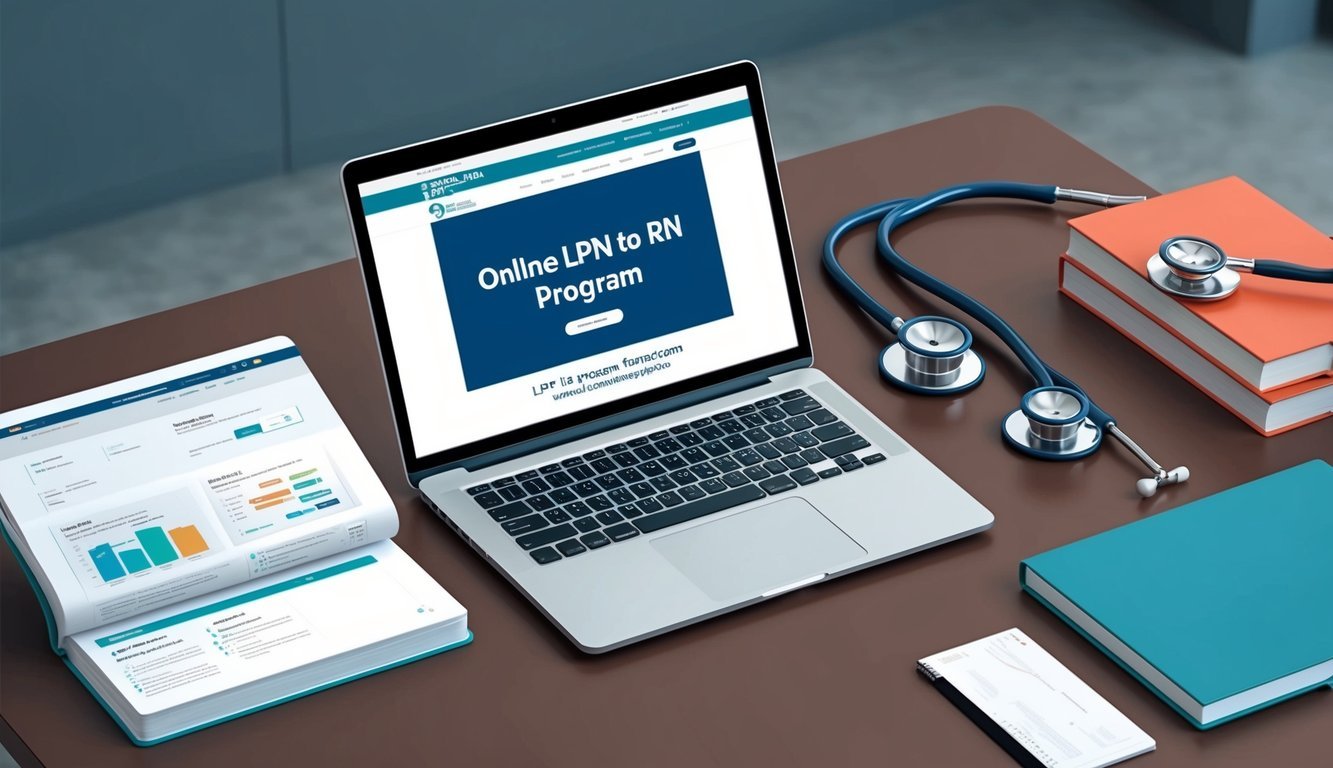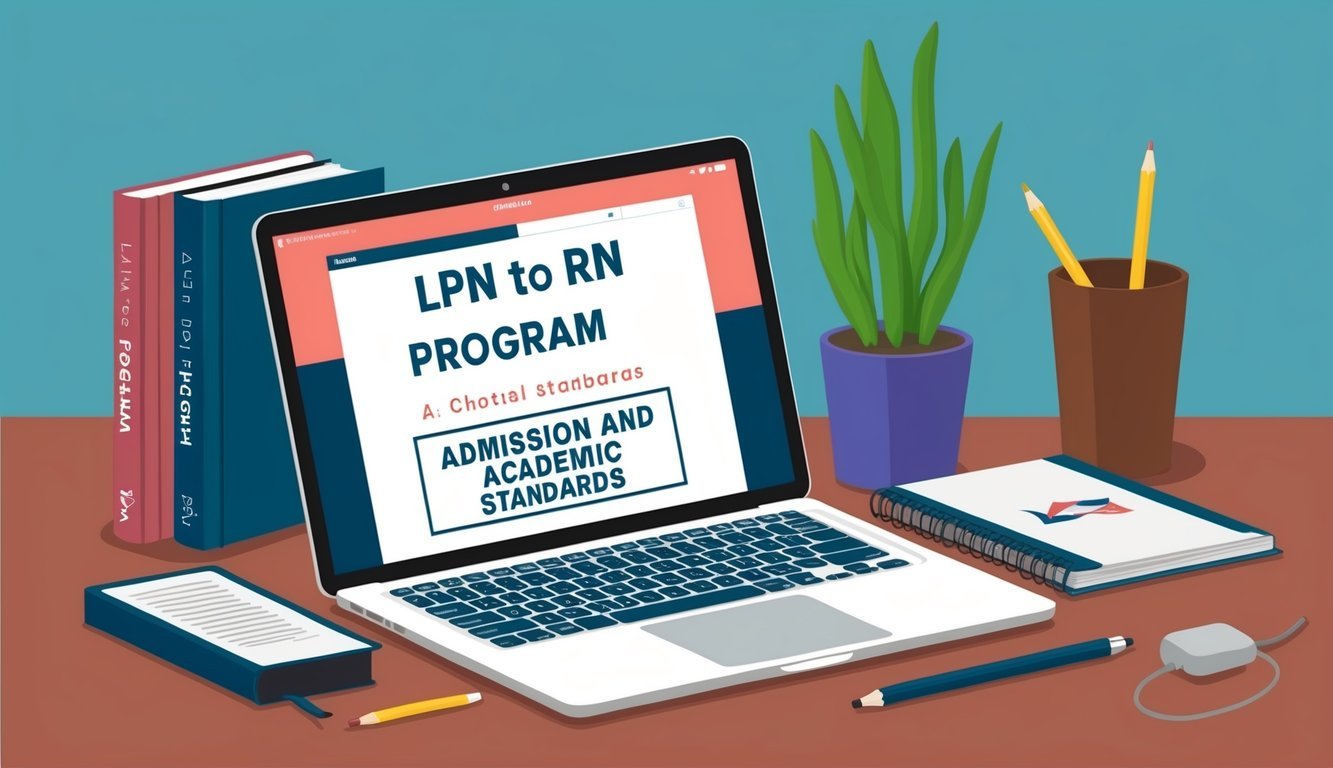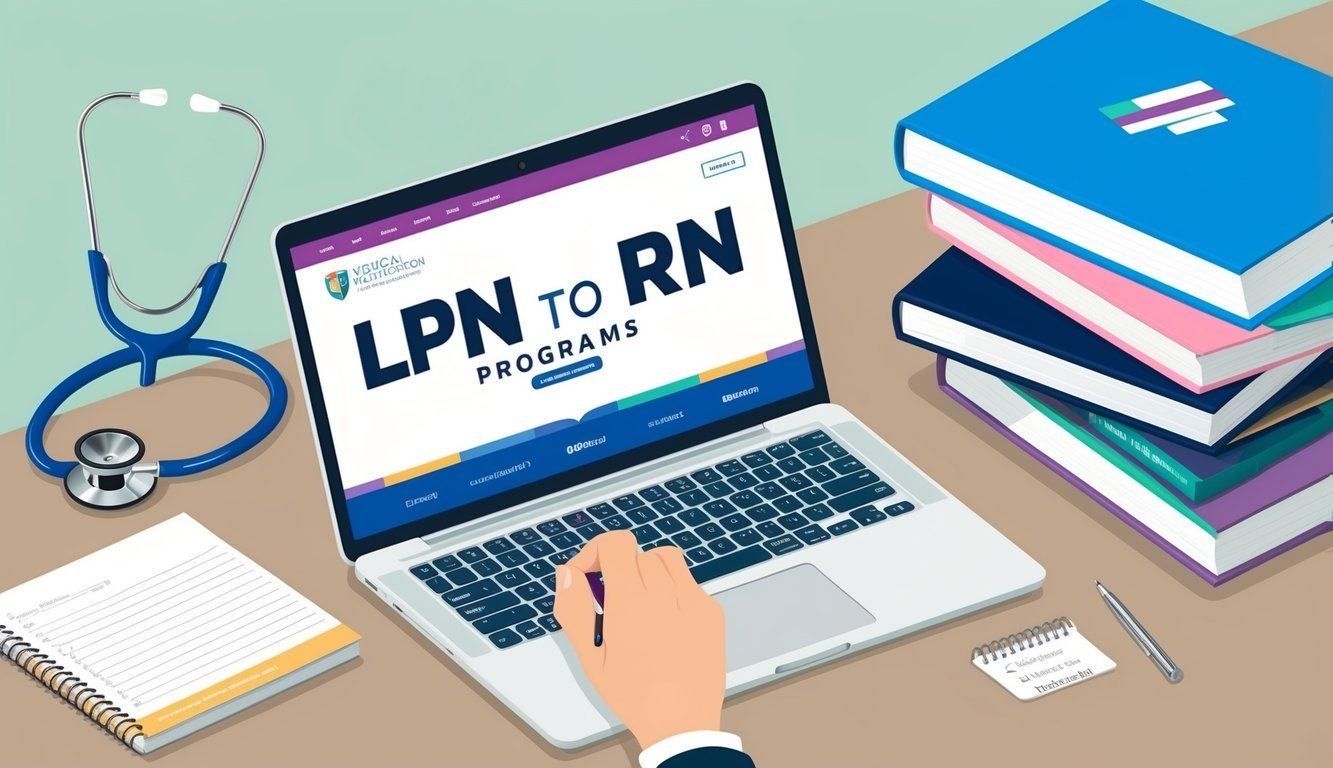Transitioning from a Licensed Practical Nurse (LPN) to a Registered Nurse (RN) can significantly enhance your career opportunities and earning potential. Online LPN to RN programs provide a flexible and efficient pathway for you to achieve this goal.
They allow you to balance education with your existing responsibilities. As healthcare continues to evolve, the demand for qualified RNs grows, making this the ideal time to take the next step in your nursing career.
These programs typically offer various formats, including hybrid options that combine online coursework with in-person clinical experiences.
This approach allows you to gain the necessary knowledge while still managing your personal and professional life.
Many institutions provide resources to help you compare program rankings, tuition rates, and admission requirements, making your search for the right program easier.
Whether you’re looking for an Associate Degree in Nursing (ADN) or a Bachelor of Science in Nursing (BSN) route, there are numerous options available to meet your needs.
Exploring platforms that highlight the best LPN to RN online programs can guide you in making an informed decision for your career advancement.
Understanding LPN to RN Programs
LPN to RN programs provide a pathway for licensed practical nurses (LPNs) to advance their careers by becoming registered nurses (RNs).
These bridge programs are designed to enhance your clinical skills and knowledge, offering greater autonomy and earning potential in the nursing field.
Overview of LPN to RN Bridge Programs
LPN to RN bridge programs facilitate your transition from LPN to RN status.
They typically allow you to complete the necessary coursework in a shorter time than traditional RN programs.
Many institutions offer both online and hybrid options, giving you the flexibility to balance your studies with your work schedule.
Program Requirements:
- High school diploma or GED
- Active LPN license in good standing
- Minimum GPA criteria
Programs vary, but you may find that clinical hours and examinations are key components.
For example, institutions like Nurse.org outline specific prerequisites and timelines, which can help you in planning your educational pathway.
Benefits of Becoming a Registered Nurse
Advancing from LPN to RN offers several significant benefits.
One major advantage is the increased earning potential.
RNs earn a median salary of approximately $86,000 annually, compared to around $59,000 for LPNs, as reported by the Bureau of Labor Statistics.
Additionally, becoming an RN provides greater autonomy in patient care.
RNs are often responsible for administering medications, coordinating care, and making critical decisions about patient treatment.
This expanded role may lead to more fulfilling work experiences.
Participating in an LPN to RN bridge program not only enhances your skill set but also opens doors for further career advancement in specialized nursing areas.
For more information on available programs and structures, consider checking resources such as PracticalNursing.org.
Educational Pathways

Navigating the transition from Licensed Practical Nurse (LPN) to Registered Nurse (RN) involves specific educational pathways.
Understanding these options will help you make an informed decision that aligns with your career goals and aspirations in nursing education.
From LPN to ADN/ASN
The LPN to Associate Degree in Nursing (ADN) program is designed for practical nurses seeking to obtain their RN credentials in a shorter timeframe.
Typically, these programs take about 1 to 2 years to complete and include both online and in-person coursework.
Key components of the ADN pathway include:
- Clinical Experience: Hands-on training in a clinical setting.
- Core Nursing Courses: Subjects such as pharmacology, adult health, and maternal-child health.
- Licensure Preparation: Completion of the NCLEX-RN to obtain your RN license.
These programs often have flexible scheduling options, catering to working professionals.
You can explore various LPN to ADN programs that suit your needs.
LPN to BSN Degree
If you aim for a more advanced level of education, the LPN to Bachelor of Science in Nursing (BSN) program is a strong option.
This pathway generally takes 2 to 4 years to complete and provides a comprehensive nursing education.
Key aspects of the BSN degree include:
- Expanded Curriculum: In-depth coursework in research, leadership, and community health nursing.
- Higher Earning Potential: RNs with a BSN typically earn higher salaries compared to those with an ADN.
- Career Advancement: A BSN opens doors to managerial positions and specialized roles.
BSN programs also offer various structures, including online, hybrid, and traditional formats.
Investigating available LPN to BSN programs can help you choose the right one for your future in nursing.
Online Program Structure
In online LPN to RN programs, the structure emphasizes a combination of nursing coursework and clinical experiences.
Understanding this framework is crucial for your success as you transition from a Licensed Practical Nurse (LPN) to a Registered Nurse (RN).
Coursework and Curriculum
The nursing curriculum in online programs typically covers essential subjects such as pharmacology, nursing theory, and anatomy.
You will encounter specialized courses that focus on critical thinking, nursing skills, and patient care in diverse settings.
| Course Type | Description |
|---|---|
| Core Courses | Foundational knowledge in nursing theory |
| Electives | Specialized topics like mental health |
| Clinical Theory | Principles of nursing practice |
These programs are designed to meet the academic requirements for a BSN degree.
You can expect a program length ranging from 12 months to two years, depending on your previous education and the specific program you choose.
Engaging fully with the coursework will enhance your readiness for clinical practicums.
Clinical Requirements and Practicums
Clinical experiences are a vital component of online LPN to RN programs.
You will typically be required to complete a set number of hours in various healthcare settings, allowing you to apply theoretical knowledge in real-world scenarios.
| Clinical Component | Details |
|---|---|
| Locations | Hospitals, clinics, or community health centers |
| Hours Required | Typically 400-800 hours, varies by program |
During these clinical practicums, you will develop essential nursing skills, such as patient assessment and care planning.
Additionally, these experiences enhance your competency in nursing practice, ensuring you are well-prepared for the challenges of the healthcare environment.
Online learning platforms may offer support through virtual simulations, which further enrich your clinical education.
Admission and Academic Standards

When considering online LPN to RN programs, understanding admission requirements and academic standards is crucial.
These factors will guide your preparation for enrollment and ensure you meet the expectations of your chosen program.
Admission Requirements and Entrance Exams
To qualify for most LPN to RN programs, you will typically need to fulfill certain admission requirements.
These often include:
- Valid LPN license: You must be a licensed practical nurse.
- Education prerequisites: A high school diploma or equivalent is necessary.
- GPA: Many programs require a minimum GPA, usually around 2.5–3.0.
- Entrance exams: Some institutions may ask for standardized test scores, such as the TEAS or HESI.
Meeting these criteria is vital for acceptance.
Additionally, some programs may require documented clinical hours from your LPN education.
You can explore options like nursingprocess.org for detailed program requirements.
Accreditation and Educational Quality
Accreditation plays a key role in the quality of your education and future employability.
Look for programs accredited by organizations like the Accreditation Commission for Education in Nursing (ACEN) or the Commission on Collegiate Nursing Education (CCNE).
Accredited programs ensure:
- High educational standards: You receive quality instruction aligned with industry requirements.
- Eligibility for licensure: Graduating from an accredited program is often necessary to sit for the NCLEX-RN exam.
- Transfer options: If you decide to pursue a BSN, many institutions require prior accredited training.
Verify the accreditation status of your chosen program to avoid issues related to nursing licensure and to understand the NCLEX-RN pass rates associated with the curriculum.
Career Trajectory and Outcomes

As you transition from an LPN to an RN through LPN to RN bridge programs, understanding your career trajectory is essential.
You will encounter various licensure requirements, employment opportunities, and potential salary increases, contributing to your professional growth in nursing.
Licensure and Certification
After completing an accredited LPN to RN program, you must obtain your RN license.
This involves passing the NCLEX-RN exam, which assesses your readiness to practice as a registered nurse.
Key aspects include:
- NCLEX Pass Rate: This determines the effectiveness of your program. High pass rates often indicate better preparation.
- State Requirements: Each state has specific licensing requirements. Ensure you understand your state’s guidelines.
Registering with the state nursing board is crucial for your career advancement.
Licensed RNs can pursue higher roles and specialized areas in nursing, such as nursing leadership.
Employment Opportunities and Salary
Transitioning to RN status significantly impacts your employment opportunities and potential salary.
Registered Nurses earn higher salaries than LPNs.
The average annual income for RNs is around $86,070, compared to approximately $59,790 for LPNs.
Consider the following factors:
| Factor | LPN Average Salary | RN Average Salary |
|---|---|---|
| Salary | $59,790 | $86,070 |
| Opportunities for Advancement | Limited | Extensive |
RNs have a broader scope of practice and responsibilities, including decision-making and patient management.
This opens doors to various settings, from hospitals to specialized clinics.
Your career path may also lead to leadership positions, enhancing your professional development and job satisfaction.

